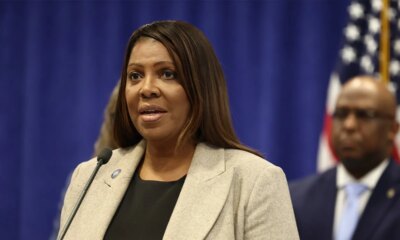South Dakota
Public forum highlights potential property tax political storm • South Dakota Searchlight

RAPID CITY — Some frustrated taxpayers attended a public forum Saturday to tell state officials they’re taking the wrong approach to taxation.
Several of the roughly 100 attendees said legislators and Gov. Kristi Noem should raise the sales tax rate instead of reducing it, and use the money to replace some of the local government revenue currently supplied by property taxes.
“I don’t think there’s any other way around getting our property taxes taken care of unless we raise the sales tax,” said audience member Beth Paulson, of Custer.
Rapid rise in South Dakota home prices is ‘not sustainable,’ economist says
One of the panelists, Donald Olstad, a Hot Springs businessman and former school board member, estimated that a several-percentage-point increase in the sales tax rate could wholly replace property taxes.
“And that would be a great debate,” Olstad said.
But elected officials and some political activists are moving in the opposite direction.
Gov. Kristi Noem started a push for lower sales taxes during her reelection campaign in 2022, when she promised to exempt groceries from the state sales tax.
Legislators rejected that proposal in 2023 and instead adopted their own proposal to reduce the state sales tax rate from 4.5% to 4.2%. The reduction is scheduled to expire in 2027, unless legislators make it permanent.
Meanwhile, a Democratic-led citizen group is circulating petitions to put a measure on the Nov. 4 general election ballot that would remove state sales taxes from grocery purchases.
Sales, tourism taxes discussed
Some forum attendees suggested increasing the state tourism tax. That’s a 1.5% tax on hotels, campgrounds and some other tourism-related activities.
Beyond the state sales tax and tourism tax, cities can impose up to an additional 2% sales tax, plus another 1% entertainment tax on items such as alcohol, restaurants, hotels and events.
Sales tax revenue goes to cities and the state. Property taxes go primarily to counties and schools.
State Rep. Trish Ladner, R-Hot Springs, is trying to convince her fellow legislators to do something about rising property taxes. She introduced property tax relief bills each of the last two legislative sessions in Pierre, with limited success.
She also organized the forum Saturday in a lecture hall on the South Dakota Mines university campus. When discussion turned to raising the sales tax rate in order to reduce or stabilize property taxes, Ladner said it’s an idea worth considering.
“The thing about sales tax, too, is that the tourists would help pay for it. I like that,” Ladner said. “I’m just saying we need to be open to alternative methods.”
Ladner and Olstad were panelists at the forum. Other panelists were Matt Krogman, a Brookings real estate agent and lobbyist for the South Dakota Association of Realtors; Rep. Mike Derby, R-Rapid City; Rep. Dennis Krull, R-Hill City; and Pennington County Commissioner Ron Rossknecht. The moderator was Garth Wadsworth, of the Elevate Rapid City economic development group.
Homeowner taxes up 47% since ’17
Though the two-hour event was civil, many audience members vented their displeasure with property taxes. Statistics from the state Department of Revenue show the property tax burden has fallen increasingly on homeowners and commercial property owners in recent years.
The trend was exacerbated after 2017. Since then, property tax payments have gone up 47% for owner-occupied homes and 36% for commercial property, while rising 3% for agricultural property.
One factor in the trends was a change from market to productivity-based valuations for agricultural land. The implementation period for the change concluded in 2019, after the Legislature adopted it in 2009. At the time, lawmakers were concerned that surging prices for farm and ranch land were unfairly inflating tax valuations.
Another factor was the COVID-19 pandemic, when South Dakota experienced an influx of remote workers and other homebuyers fleeing pandemic restrictions in other states. According to research by the Dakota Institute, high demand for houses helped push the average list price in the state 36% higher from 2020 to 2023, even after accounting for inflation.
Because tax valuations for houses are tied to the market, some South Dakota homeowners have experienced several years of double-digit valuation increases. And those steep valuation increases have driven their property taxes higher.
Olstad said Gov. Noem’s focus on attracting new residents to the state has been a factor in that.
“This probably doesn’t sound right, but I think we should ‘close the gate,’” Olstad said. “I’m not in favor of the governor inviting everybody.”
Other ideas for property tax relief
Raising the sales tax or tourism tax rate wasn’t the only idea floated during the forum.
Multiple attendees encouraged Ladner to reintroduce a failed bill she sponsored during the last legislative session.
The bill would revert property valuations back to their 2020 levels for single-family, owner-occupied homes purchased before then. Excess taxes paid in the intervening years would not be refunded, but future tax increases would be capped at 3%.
One person suggested repealing some of the dozens of sales tax exemptions in state law and capturing the extra revenue for property tax relief.
Some sales tax exemptions are broad, such as the one for items purchased to be resold. Those include packaging for products and items that will become an ingredient or component of another product.
Other exemptions are narrow, such as an exemption for services performed by rodeo promoters, stock contractors, announcers, judges and clowns.
Rep. Derby encouraged greater participation in existing property tax relief programs, which he said are underutilized. Those include help for disabled veterans, senior citizens and people with paraplegia. Applications are available from county directors of equalization or county treasurers.
There was broad agreement at the forum among panelists and attendees that a failure to rein in property tax increases for homeowners could have negative economic consequences for the state.
Krogman, the real estate agent and lobbyist, cited examples of three properties in Brookings that he said experienced year-over-year tax valuation increases from $343,000 to $473,000, from $333,000 to $445,000, and from $322,000 to $432,000.
“I’m just afraid if we can’t figure something out, the opportunity of owning a house is going to become more and more difficult,” he said.
GET THE MORNING HEADLINES DELIVERED TO YOUR INBOX

South Dakota
SD Lottery Mega Millions, Millionaire for Life winning numbers for March 3, 2026
The South Dakota Lottery offers multiple draw games for those aiming to win big.
Here’s a look at March 3, 2026, results for each game:
Winning Mega Millions numbers from March 3 drawing
07-21-53-54-62, Mega Ball: 16
Check Mega Millions payouts and previous drawings here.
Winning Millionaire for Life numbers from March 3 drawing
09-10-13-25-54, Bonus: 05
Check Millionaire for Life payouts and previous drawings here.
Feeling lucky? Explore the latest lottery news & results
Are you a winner? Here’s how to claim your prize
- Prizes of $100 or less: Can be claimed at any South Dakota Lottery retailer.
- Prizes of $101 or more: Must be claimed from the Lottery. By mail, send a claim form and a signed winning ticket to the Lottery at 711 E. Wells Avenue, Pierre, SD 57501.
- Any jackpot-winning ticket for Dakota Cash or Lotto America, top prize-winning ticket for Lucky for Life, or for the second prizes for Powerball and Mega Millions must be presented in person at a Lottery office. A jackpot-winning Powerball or Mega Millions ticket must be presented in person at the Lottery office in Pierre.
When are the South Dakota Lottery drawings held?
- Powerball: 9:59 p.m. CT on Monday, Wednesday, and Saturday.
- Mega Millions: 10 p.m. CT on Tuesday and Friday.
- Lucky for Life: 9:38 p.m. CT daily.
- Lotto America: 9:15 p.m. CT on Monday, Wednesday and Saturday.
- Dakota Cash: 9 p.m. CT on Wednesday and Saturday.
- Millionaire for Life: 10:15 p.m. CT daily.
This results page was generated automatically using information from TinBu and a template written and reviewed by a South Dakota editor. You can send feedback using this form.
South Dakota
Nebraska volleyball to play regular-season match in South Dakota

Nebraska volleyball will play South Dakota State in a regular-season match in Brookings, S.D. The Huskers will face the Jackrabbits on September 2 at First Bank & Trust Arena.
Nebraska finished 2025 with a 33-1 overall record and was ranked No. 3 in the final AVCA poll of the season. South Dakota State was 23-5 and was the Summit League regular-season champions.
These two programs have faced each other before. They played a spring exhibition match in May 2025. The Huskers were victorious by a 4-0 sweep (25-18, 25-19, 25-17, 25-19).
Harper Murray led the Huskers in kills with 12, while also earning seven digs, five blocks and two aces. Andi Jackson delivered a double-double on the day, finishing with 11 kills and 10 blocks.
Nebraska is scheduled to play two exhibition games this spring. The Huskers will face Iowa State in Sioux Falls, S.D. on April 11 and Creighton in Omaha on April 17.
Contact/Follow us @CornhuskersWire (https://twitter.com/CornhuskersWire) on X (formerly Twitter) and like our page onFacebook (https://www.facebook.com/CornhuskersWire) to follow ongoing coverage of Nebraska news, notes and opinions.
South Dakota
SD Lottery Powerball, Lotto America winning numbers for March 2, 2026
The South Dakota Lottery offers multiple draw games for those aiming to win big.
Here’s a look at March 2, 2026, results for each game:
Winning Powerball numbers from March 2 drawing
02-17-18-38-62, Powerball: 20, Power Play: 2
Check Powerball payouts and previous drawings here.
Winning Lotto America numbers from March 2 drawing
03-08-17-24-34, Star Ball: 06, ASB: 02
Check Lotto America payouts and previous drawings here.
Winning Millionaire for Life numbers from March 2 drawing
28-41-42-50-55, Bonus: 02
Check Millionaire for Life payouts and previous drawings here.
Feeling lucky? Explore the latest lottery news & results
Are you a winner? Here’s how to claim your prize
- Prizes of $100 or less: Can be claimed at any South Dakota Lottery retailer.
- Prizes of $101 or more: Must be claimed from the Lottery. By mail, send a claim form and a signed winning ticket to the Lottery at 711 E. Wells Avenue, Pierre, SD 57501.
- Any jackpot-winning ticket for Dakota Cash or Lotto America, top prize-winning ticket for Lucky for Life, or for the second prizes for Powerball and Mega Millions must be presented in person at a Lottery office. A jackpot-winning Powerball or Mega Millions ticket must be presented in person at the Lottery office in Pierre.
When are the South Dakota Lottery drawings held?
- Powerball: 9:59 p.m. CT on Monday, Wednesday, and Saturday.
- Mega Millions: 10 p.m. CT on Tuesday and Friday.
- Lucky for Life: 9:38 p.m. CT daily.
- Lotto America: 9:15 p.m. CT on Monday, Wednesday and Saturday.
- Dakota Cash: 9 p.m. CT on Wednesday and Saturday.
- Millionaire for Life: 10:15 p.m. CT daily.
This results page was generated automatically using information from TinBu and a template written and reviewed by a South Dakota editor. You can send feedback using this form.
-

 World6 days ago
World6 days agoExclusive: DeepSeek withholds latest AI model from US chipmakers including Nvidia, sources say
-

 Massachusetts7 days ago
Massachusetts7 days agoMother and daughter injured in Taunton house explosion
-

 Denver, CO7 days ago
Denver, CO7 days ago10 acres charred, 5 injured in Thornton grass fire, evacuation orders lifted
-

 Louisiana1 week ago
Louisiana1 week agoWildfire near Gum Swamp Road in Livingston Parish now under control; more than 200 acres burned
-

 Oregon5 days ago
Oregon5 days ago2026 OSAA Oregon Wrestling State Championship Results And Brackets – FloWrestling
-

 Florida3 days ago
Florida3 days agoFlorida man rescued after being stuck in shoulder-deep mud for days
-

 Maryland3 days ago
Maryland3 days agoAM showers Sunday in Maryland
-

 Culture1 week ago
Culture1 week agoTry This Quiz on Thrilling Books That Became Popular Movies






















